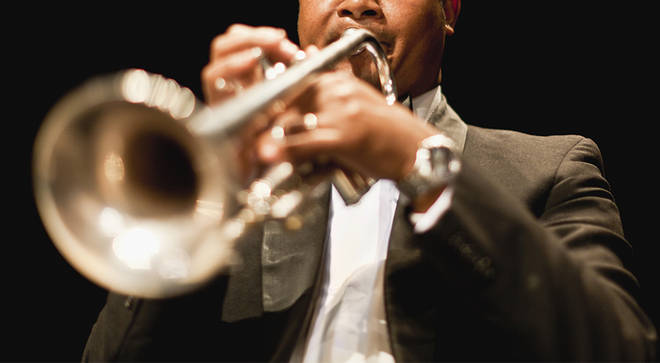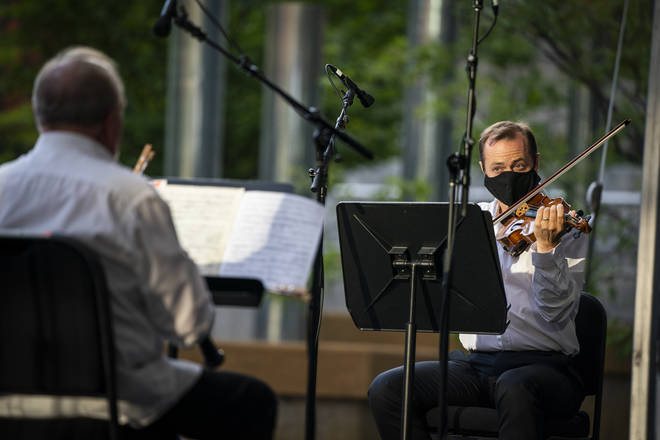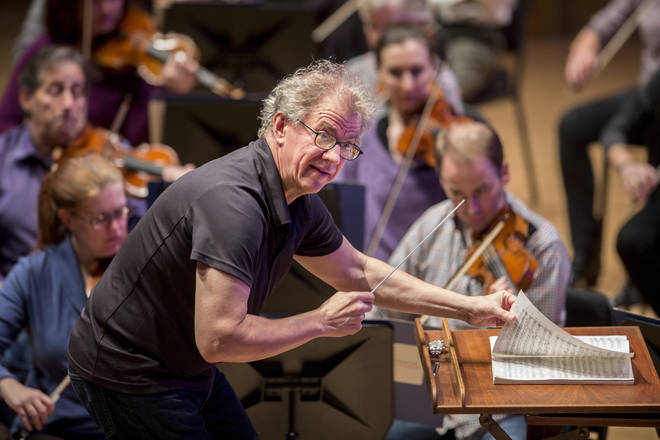It's all about the classical music composers and their works from the last 400 years and much more about music. Hier erfahren Sie alles über die klassischen Komponisten und ihre Meisterwerke der letzten vierhundert Jahre und vieles mehr über Klassische Musik.
Total Pageviews
Sunday, October 25, 2020
Fantasia on Smoke on the Water
Thursday, October 22, 2020
US orchestra study finds trumpet ‘riskiest’ instrument for spreading COVID-19

By Maddy Shaw Roberts, ClassicFM
 |  |
A University of Minnesota study discovers the wind instruments that emit the most aerosols, and are therefore “riskiest” in the transmission of COVID-19.
Trumpets and oboes, as well as bass trombones, were found to be “high risk” compared to other brass and woodwind instruments, in new research into coronavirus transmission in orchestras.
Bass clarinet and tuba were found to be “lower risk”.
Researchers from the University of Minnesota found that while trumpets and oboes were the “riskiest” instruments for transmitting airborne diseases, none of the examined wind instruments were found to spread aerosols further than one foot.
Published last month in the Journal of Aerosol Science, the study investigated 15 musicians from the Minnesota Orchestra in an effort to help them return to live music-making in a COVID-secure way.
Researchers say their findings could provide “valuable insights into the risk assessment of airborne disease transmission and the corresponding mitigation strategies for different musical activities involving the usage of wind instruments”.
Read more: UK government’s latest guidance for live music-making >

In the study, researchers tracked the aerosols emitted from 10 orchestral woodwind and brass instruments: the flute, piccolo, bass clarinet, oboe and bassoon; tuba, French horn, trumpet, trombone and bass trombone.
The concentration of aerosols – tiny air particles that can contain viruses and lead to the transmission of airborne diseases like COVID-19 – produced from instruments, was then compared with the amount produced by players when simply breathing or speaking.
Read more: Singing ‘no riskier than talking’, UK study says >
“As higher aerosol concentration leads to an increased risk of airborne disease transmission, we categorise these instruments into low, intermediate, and high-risk levels,” researchers said.
The aerosols coming from instruments ranged from 20 to 2,400 particles per litre of air. When players were tested when breathing or speaking, they produced an average of just 90 and 230 particles per litre respectively.
Trumpet, oboe and bass trombone players, in particular, were likely to produce more aerosols when playing, than while speaking and breathing. The researches termed these instruments “high risk” for transmitting airborne diseases.
The bassoon, piccolo, flute, bass clarinet and French horn were considered an “intermediate risk”.
Perhaps due to the tube length of the instrument, the tuba was termed “low risk”.
Scientists said mouthpiece designs could also affect the level of aerosols produced.
“All of this information I think is very useful for planning,” said Department of Mechanical Engineering Associate Professor Jiarong Hong, who led the team. “Once we understand the risk level of different instruments, we can actually target the higher risk instruments. You certainly don’t want to have a group of trumpet players playing in a confined room because that will be a very high-risk activity.”

University of Hong Kong microbiologist Dr Ho Pak-leung said the study could influence orchestral seating arrangements going forward, as the arts world looks for ways to perform live safely in pandemic times.
“Those wearing masks could sit closer, while those who can’t wear masks should sit further apart,” Ho said, adding that a distance of 1.5 metres (4.9 feet) between unmasked players would be safer.
Ho said plastic screens between players could help block some big droplets, but attested that good ventilation is still crucial in reducing the risk of transmission through tiny particles.
Researchers also recommended social distancing, putting masks over instruments and using portable filters. They found that a single-layer mask blocks 60 percent of the particles without significantly reducing sound quality. Two layers block 75 percent with a slight drop in sound quality, while three layers block 92 percent but cause a substantial dip in sound quality.
Minnesota Orchestra is currently performing for online audiences only, in small groups of no more than 25 musicians. The full orchestra consists of around 90 musicians.
President and CEO Michelle Miller Burns said the orchestra is now planning “a multi-layered approach to safety onstage and backstage that involves COVID testing, light quarantining, wearing masks, maintaining distance between musicians, and investigating bell barriers and air purifiers – all in the interest of mitigating as many risks as possible”.
She added: “This important research will benefit organisations beyond ours, and we are pleased that the University’s findings can now be shared with school groups and other ensembles to help inform and guide their decisions and safety strategies.”
Tuesday, October 20, 2020
Rockmusiker Spencer Davis ist tot
Bekannt wurde der britische Musiker in den 1960er Jahren mit Songs wie "Keep On Running". Nun ist SpencerDavis im Alter von 81 Jahren in Los Angeles gestorben.
Der Gründer der "Spencer Davis Group" starb in einem Krankenhaus der kalifornischen Stadt. Todesursache sei eine Lungenentzündung gewesen, teilte sein langjähriger Manager Bob Birk mit. Der 1939 in Wales geborene Spencer Davis sang, spielte Gitarre und Keyboard. Er hatte die nach ihm benannte Band 1963 gegründet, die bald mit Songs wie "Gimme Some Lovin" und "I'm a Man" Erfolge feiern konnte. "Keep On Running" und "Somebody Help Me" schafften es Mitte der 60er Jahre auf Platz eins der britischen Singlecharts. Viele weitere Titel schafften es in die britischen Top 40.
Seine Musiker-Karriere begann Davis während eines Studiums an der Universität Birmingham. Er trat zusammen mit zukünftigen Stars wie dem späteren Rolling-Stones-Bassisten Bill Wyman und dem Fleetwood Mac-Mitglied Christine McVie auf. In den 70er Jahren zog Davis nach Kalifornien, nahm später Solo-Alben auf, arbeitete mit anderen Musikern zusammen und tourte um die Welt.
Sein Manager Birk würdigte ihn als hochmoralischen, sehr talentierten, gutmütigen, extrem intelligenten und großzügigen Menschen. Davis hinterlässt seine Partnerin June und drei erwachsene Kinder.
qu/rb (dpa, ap)

